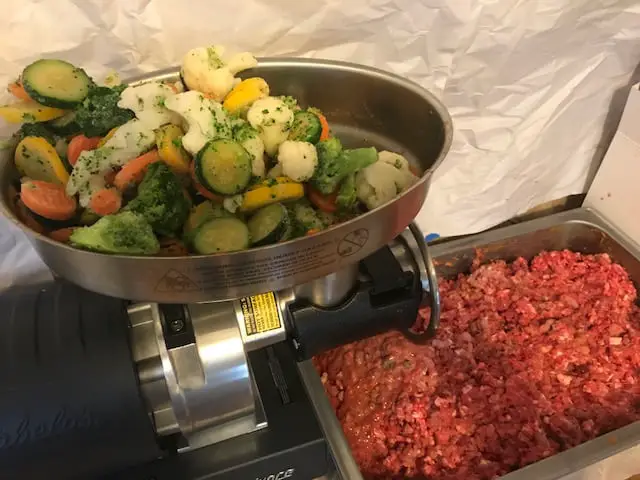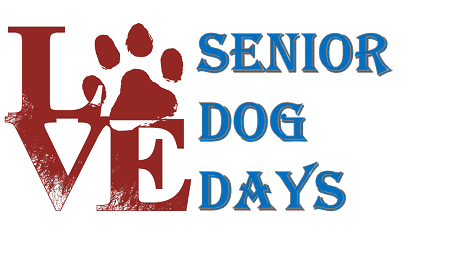Some content may contain affiliate links to products which means we could earn a fee on your purchase. Thank you for visiting
I’m not a fan of blanket statement responses so let’s break this into 3 reasons why you might be asking the question:
“Can my senior dog eat puppy food?”
Reason #1 for asking – Can my senior dog eat puppy food?
Your senior dog accidentally consumed puppy food. If you are worried that your healthy senior dog has consumed some puppy food chances are very good that she’ll be fine. Puppy food is calorie rich and has a higher fat content so she may have softer stool or may be thirstier than normal.
Monitor your senior dog and pay attention to bathroom signals.
Reason #2 for asking if your senior dog can eat puppy food
It’s the only food your senior, geriatric dog will eat. If you are feeding puppy food because it’s the only food your dog in failing health will eat and your choice is puppy food or nothing; then puppy food it is. You might also try some homemade food at this point, like ground chicken or ground beef slurries.

Reason #3 for asking – Can my senior dog eat puppy food?
You are wondering if puppy food should be your senior dog’s main diet. If you are looking into feeding your senior dog puppy food because: you have a puppy and it’s easier to buy one type of food, you think it might be better for her nutritionally, puppy food is cheaper, your senior dog likes it better; the answer is: NO.
Your senior dog has different dietary needs than a puppy and unless your veterinarian has instructed you to feed your healthy, senior dog puppy food, you should not be feeding it to her as her regular diet.
Here is why:
Reasons NOT to Give Your Senior Dog Puppy Food
Puppy Food Formula Helps Puppies Not Seniors
Puppy food is designed and specifically formulated to meet the nutritional needs of dogs who are growing rapidly…this is NOT your senior dog. Special attention is given to a puppy’s growing organs, muscles, bones and their immune system.
A puppy’s body needs specific nutrients in greater quantities than a senior dog can utilize. Some puppy foods have 2 or 3 times the requirements of what your senior dog can handle and that alone can have unintended consequences.
As dogs age, we know that excess vitamins and minerals can wreak havoc on a senior dog’s overall health, and the symptoms of vitamin overdose can be slow to surface.
A lot of irreversible damage can be done to your senior dog before you have any indication that he is suffering.
Puppy Food is too Calorie Dense for Older Dogs
Aside from puppy food having the wrong dietary focus for your senior dog; puppy food is very high in fat. Higher fat content makes puppy food very calorie dense. Healthy, senior dogs do not require foods that are focused on being calorie-dense. If you’ve ever considered a raw diet for your senior dog, you can come back to this beginners guide: Starting a Senior Dog on a Raw Diet.

Likely Results if You Feed your Senior Dog Puppy Food
Hunger
If you feed calorie dense food to your senior dog using the appropriate calories, your senior dog will be hungry because the actual quantity of food you’d give her would be very small.
In order to satisfy your senior dog’s hunger you will have to feed larger quantities of puppy food which means more of everything a senior dog doesn’t need.
Puppy Food Cause Weight Gain in Older Dogs
Senior dogs are considerably less active than puppies and adult dogs, which means they are at a high risk for weight gain. On top of being less active, their metabolism slows and many of their bodily functions become less efficient.
So many diseases and poor health are a direct result of senior dog’s being overweight. Your healthy senior dog does not require the extreme calorie density that puppy food offers.
Puppy Food Gives Older Dogs Diarrhea
As our dogs age they might require more fiber or foods that focus on keeping the digestive and intestinal systems clean and regular.
Puppy food’s fat content alone could be enough to disrupt a senior dog’s system and result in intestinal discomfort and diarrhea.
Constantly soft stool or diarrhea leads to dehydration which could spark a whole new set of health complications.
Puppy Food Lacks Nutrients for Older Dogs
A good senior dog diet includes glucosamine, msm, and omega fatty acids to help keep senior dog’s joints cushioned in old age. Our senior dogs experience pain from inflammation and they develop arthritis, hip dysplasia, and other joint disorders as they progress through their senior years. None of these much needed nutrients will be found in puppy food.
Glucosamine supports cartilage and omega fatty acids help keep joints lubricated and both nutrients help keep our older dogs mobile.
In Summary
Senior dogs need special nutrients and their regular diet should focus on fulfilling their needs. Your healthy senior dog does not need what puppy food is offering and unintended, unwelcome consequences could result if you feed it to your senior dog as his regular diet.
Thanks for stopping by SeniorDogDays!

